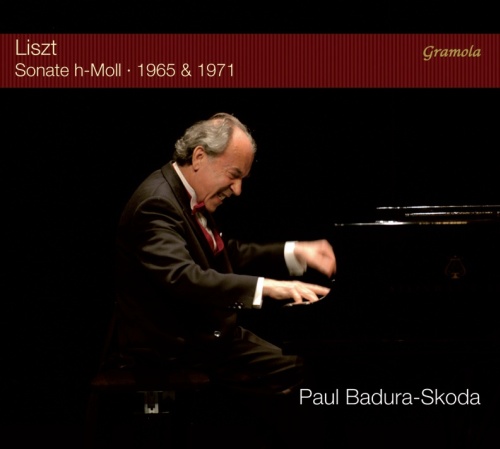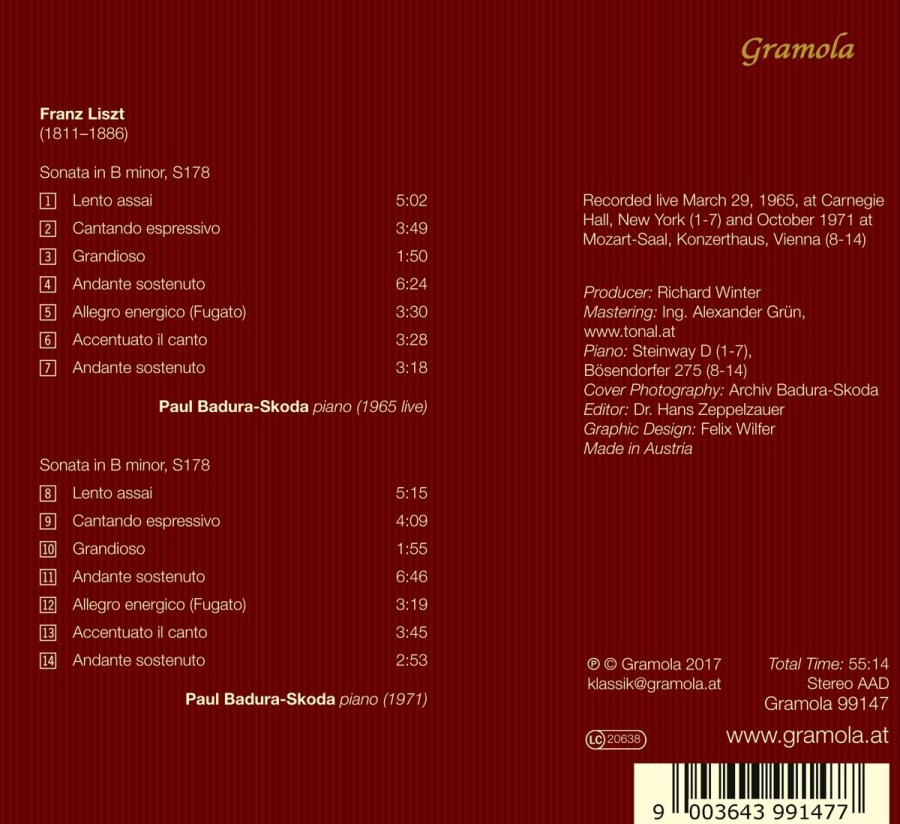
classical music distribution


(Produkt nie został jeszcze oceniony)
kompozytor
Liszt, Franz
tytuł
Liszt: Sonate h-Moll, recorded 1965 & 1971
wykonawcy
Badura-Skoda, Paul
nr katalogowy
99147
opis
Three events were decisive for Paul Badura-Skoda’s beginnings: Furtwangler and Karajan hired the still unknown musician for their concerts in Vienna in 1949. By standing in for the sick Edwin Fischer at the Salzburg Festival in 1950 he became an international star. Major tours as a soloist followed. Further highlights in his career were his first tour of Japan, where he appeared in Tokyo alone 14 times, and the first, highly successful tour through the Soviet Union in 1964, which was followed by many other tours.
In 1979, Paul Badura-Skoda was the first Western pianist to perform in China after the Cultural Revolution. In the Mozart jubilee year 1991, he played the cycle of all Mozart’s sonatas in Paris, Vienna Munich, Madrid, Tokyo, Hong Kong, etc. Paul describes his performance of the B minor Sonata by Franz Liszt from March 29, 1965 in the Carnegie Hall in New York as “one of the most inspired achievements of my career as a pianist.” To confront a perficious and nasty critique two weeks before in the same venue, Badura-Skoda played as unleashed, with an enormous energy, fuelled in part by internal fury. This concert recording which is to an extent owed to that heat of the moment is being published now, featuring a second interpretation of the same Sonata, a studio recording made in the Mozartsaal of the Vienna Konzerthaus six years later.
This version is more controlled and, in the calmer passages, more internalized and contemplative than the New York interpretation. Let it be up to the listener to decide which of the two versions is the preferred one.
In 1979, Paul Badura-Skoda was the first Western pianist to perform in China after the Cultural Revolution. In the Mozart jubilee year 1991, he played the cycle of all Mozart’s sonatas in Paris, Vienna Munich, Madrid, Tokyo, Hong Kong, etc. Paul describes his performance of the B minor Sonata by Franz Liszt from March 29, 1965 in the Carnegie Hall in New York as “one of the most inspired achievements of my career as a pianist.” To confront a perficious and nasty critique two weeks before in the same venue, Badura-Skoda played as unleashed, with an enormous energy, fuelled in part by internal fury. This concert recording which is to an extent owed to that heat of the moment is being published now, featuring a second interpretation of the same Sonata, a studio recording made in the Mozartsaal of the Vienna Konzerthaus six years later.
This version is more controlled and, in the calmer passages, more internalized and contemplative than the New York interpretation. Let it be up to the listener to decide which of the two versions is the preferred one.
nośnik
CD
gatunek
Muzyka klasyczna
producent
Gramola
data wydania
17-08-2017
EAN / kod kreskowy
9003643991477

(Produkt nie został jeszcze oceniony)
cena 58,00 zł
lubProdukt na zamówienie
Wysyłka ustalana indywidualnie.
Darmowa wysyłka dla zamówień powyżej 300 zł!
Darmowy kurier dla zamówień powyżej 500 zł!
sprawdź koszty wysyłkiProduktu jeszcze nie zrecenzowano, chcesz być pierwszy?
Klienci, którzy kupili ten produkt, kupili również
Kallstenius, Edvin
Kallstenius: Symphony No. 1 Sinfonietta No. 2 Musica Sinfonica
CPO 777 361-2
różni kompozytorzy
Argentum et Aurum: Musical Treasures from the Early Habsburg Renaissance
8.573346
Pozostałe płyty tego kompozytora
Liszt, Franz
Liszt: Complete Piano Music Vol. 47 - transcriptions from Christus & The Legend of St Elisabeth
8.573385
Lutosławski, Witold, Brahms, Johannes, Liszt, Franz
Liszt/ Brahms /Lutosławski: Paganini Variations / Rachmaninov: Paganini Rhapsody
ODE 1230-2D
Pozostałe płyty tego wykonawcy
Mozart, Wolfgang Amadeus
Mozart: Les quatuors pour le pianoforte, violon, alto & violoncelle K 478 & K 493
A 350
Mozart, Wolfgang Amadeus
Mozart: Sonatas No. 16 KV 545, No. 10 KV 330 & No. 11 KV 331
GRA 98989
Schubert, Franz, Strauss, Johann Jr
Tänze aus Wien - Franz Schubert & Johann Strauß Jr
99104
Napisz recenzję dla: Liszt: Sonate h-Moll, recorded 1965 & 1971
Zapytaj o dostępność produktu
Twoje zapytanie:
Odpowiemy na adres:
Produkt został dodany do koszyka

Liszt, Franz
Liszt: Sonate h-Moll, recorded 1965 & 1971
1 szt












































